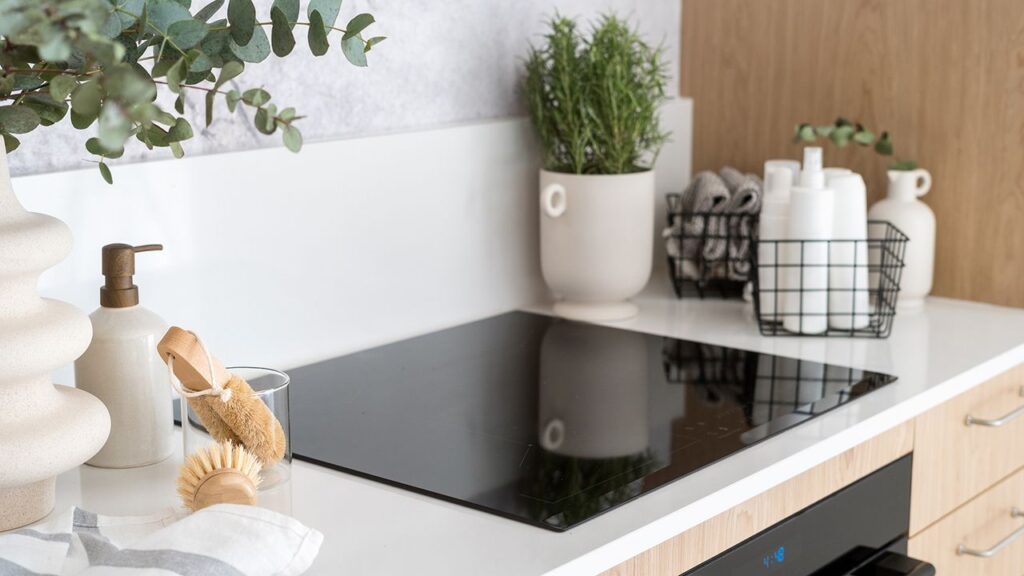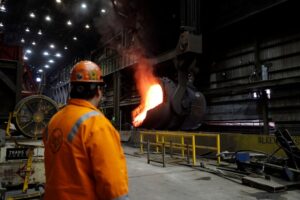
bottles of household chemicals in metal basket on countertop and wooden brushes for cleaning electrical glass ceramic stove and other appliances at kitchen; Shutterstock ID 2322657493; purchase_order: -; job: -; client: -; other: -
As home chefs increasingly consider upgrades to their kitchens, many are turning their attention to induction cooktops. These appliances have gained popularity for their precision and efficiency. To explore the benefits of this cooking technology, six culinary professionals shared their insights on what makes induction cooking special.
Precision Control Stands Out
One of the most praised features of induction cooking is its precision control, which allows for immediate adjustment of heat levels. This characteristic resonated with several chefs, including Maricel Gentile, Chef and Owner of Maricel’s Kitchen. “It responds instantly when you change the heat. Your simmer stays gentle, your stir-fry stays blazing hot, and nothing scorches,” she noted.
Gentile emphasized that the rapid responsiveness of induction cooking enables chefs to focus on flavor and technique rather than managing inconsistent heat. “Its responsiveness lets me coax out the deep soul of Filipino adobo, the soft textures in Japanese ramen, or the bright wok-wielded joys of stir-fry,” she explained.
The ability to control heat effectively is a game changer in the kitchen. Kyle Taylor, Founder and Chef at HE COOKS, added that induction cooking matches the speed of gas without the added heat in the kitchen. “Crank it up, and the water rolls to a boil in seconds,” he said. This precision allows for the successful preparation of delicate sauces and perfect chocolate melting, according to Riz Asad, blogger behind Chocolates & Chai.
Quick Heating and Easy Cleaning
Another feature that chefs appreciate is the boost function, designed to deliver a quick surge of power for faster heating. Mike Williams, VP of Sales and Marketing at Kenyon, explained, “This can be used for bringing water to a boil more quickly or searing meat.” The boost function can significantly reduce cooking time, making it especially useful for time-sensitive tasks.
However, Williams cautioned against overusing this feature. “If you use it too long, or with empty cookware, you run the risk of damaging both the cooktop and the cookware,” he advised.
Beyond cooking performance, induction cooktops are also notably easy to clean. Jessica Randhawa, Owner and Head Chef at The Forked Spoon, highlighted the convenience of a single, large glass panel. “My gas stove takes minutes to clean and requires a deep clean to be scheduled regularly,” she stated, noting that induction surfaces tend to stay cleaner due to reduced spillage.
Energy Efficiency and Safety
The energy efficiency of induction cooking is another compelling reason to consider making the switch. According to Grace Vallo, Founder and Chef at the food blog Tastefully Grace, induction cooktops heat cookware directly using electromagnetic energy rather than warming the air around it. “This direct transfer means less energy is wasted, so meals cook faster and your kitchen stays cooler,” she remarked.
Additionally, since the cooktop surface remains cooler, it enhances safety in the kitchen. Vallo pointed out that users may need to invest in magnetic cookware to fully utilize induction technology.
In summary, the culinary pros agree that switching to induction cooktops offers numerous advantages, from precision control and quick heating to easy cleaning and energy efficiency. As the trend continues, home cooks may find that the benefits of induction cooking outweigh the initial investment.







